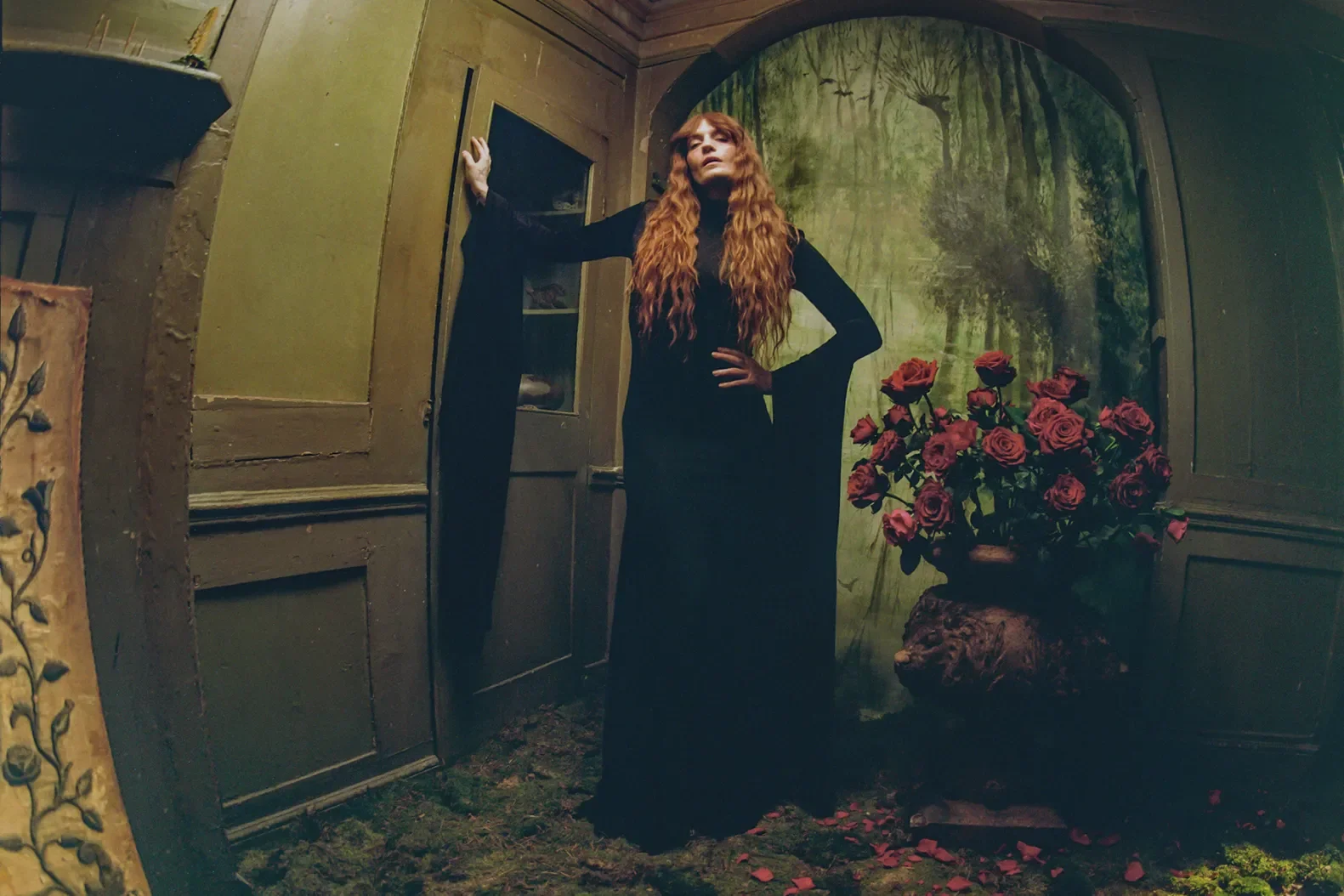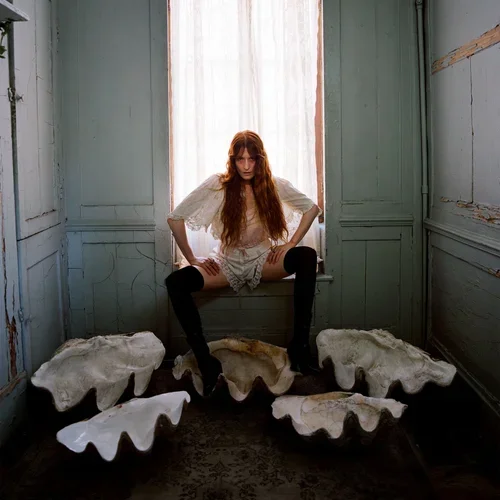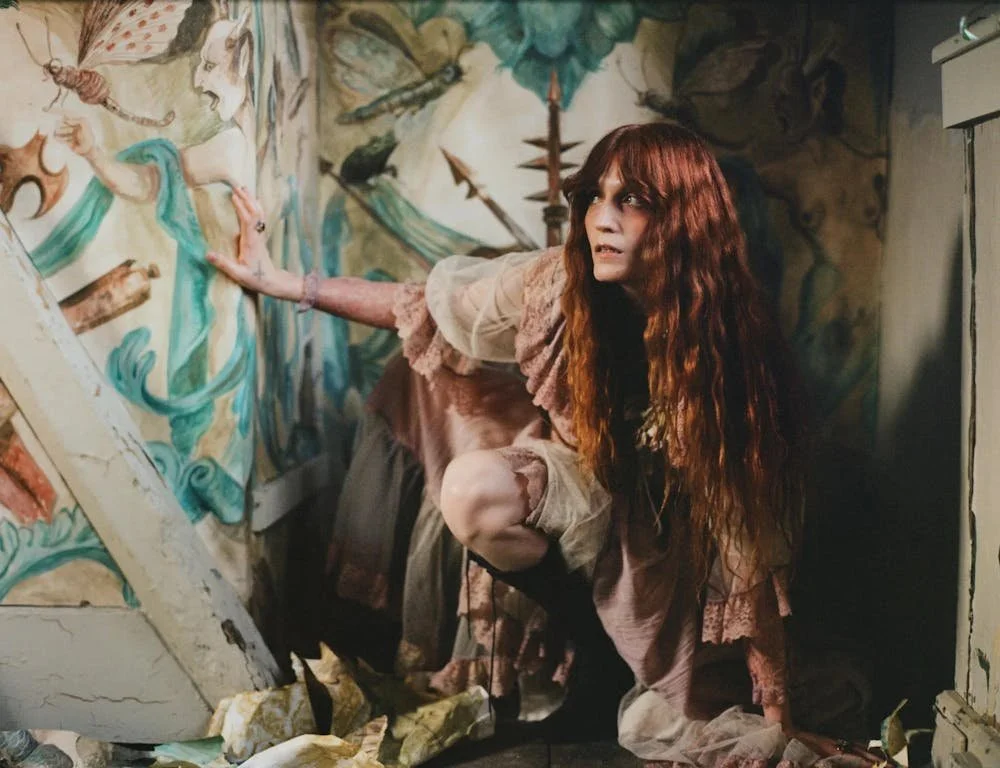“Everybody Scream” with Florence and the Machine’s New Coven
A lot has changed for Florence Welch since the release of her last album, Dance Fever, back in 2022. Welch, better known to many as Florence and the Machine, has been working on various projects since the release of Dance Fever, but her life was put on hold in 2023 due to a medical emergency. Welch would later reveal that she had suffered a miscarriage from an ectopic pregnancy, resulting in the collapse of one of her fallopian tubes and emergency life-saving surgery. While this was not the catalyst for her latest release, Everybody Scream, many of the songs on this new album clearly reckon with themes and anxieties Welch ruminated over while recovering from her near-death experience.
But this may not seem obvious based on Everybody Scream’s first impression. Its opening and titular track, which also acted as the album’s first single, feels like a raucous battle cry. Welch sings about her love of the stage, a place where she feels free and like herself. When promoting “Everybody Scream” as the album’s debut single, Welch revealed that the song’s title came first and its contents came later. Welch wanted a song that her audiences could scream, sing, and dance along to, actions she encourages within the song’s lyrics themselves. It’s the perfect debut for the album, highlighting ethereal non-lyrical vocals, dark and minor instrumentation, and lyrics relating to witchcraft and spirituality. Welch has described herself as agnostic, despite attending Catholic school. In fact, Christianity is a central theme in her discography, often used as the basis for lyrical metaphors. Her take on witchcraft and spirituality feels like a natural progression from these Catholic roots, especially considering how she’s played with its aesthetics both in her appearance and music.
But “Everybody Scream” does not explicitly reference witchcraft until its outro. She tantalizes her listeners with aesthetics before fully committing to revealing this theme. Instead, Welch uses her due diligence, alongside co-writer and indie superstar Mitski, to emphasize the intimacy Welch feels with the stage. This, in itself, is a form of magic. In a patriarchal society, women only have so many places where they can truly be themselves and express their emotions to their fullest extent. “Everybody Scream” seems to emphasize that the stage is where Welch can harness her power, an inherently witchy act.
Rather than going straight into magic as a theme, Welch takes “Everybody Scream’s” ideas on female empowerment for the album’s next track, “One of the Greats.” Do not let the acoustic opening of this track fool you, “One of the Greats” is an almost seven minute long marathon. The song’s staggering length makes it surprising that it was selected as the album’s second single, but it certainly makes sense in terms of accurately marketing Everybody Scream.
Press image for Florence Welch’s latest album, Everybody Scream.
“Everybody Scream” may have introduced the album’s sonic palette and lyrical aesthetic, but “One of the Greats” firmly establishes which lyrical themes listeners should keep an ear out for going forward. By giving the track more of an acoustic and bare bones foundation, Welch’s lyrics come to the forefront of the piece. “Everybody Scream” establishes that Welch finds her freedom on stage, whereas “One of the Greats” gives her a single seven minute long platform for her to stand on when she cannot perform live. Welch describes herself as “only beautiful under the lights/only powerful there.” This is not a direct contradiction to the theme of intimacy on stage in “Everybody Scream,” but rather an expansion on the ideas Welch originally presented. As mentioned, Welch’s near death experience inspired many of the songs on Everybody Scream. “One of the Greats” takes on Welch’s fears about her legacy head on, as a young tragic death often immortalizes figures in ways they cannot anticipate. The song also reflects Welch’s artistic process, as she has described creating her albums as a cycle of death and resurrection. With Welch’s tango with death mimicking her artistic process, it’s no wonder that she felt compelled to create an all-encompassing track about her relationship with art and death. While the instrumentation at the beginning “One of the Greats” may feel slightly underwhelming, the electric guitar, drums, and eventually even strings, build to a rousing crescendo accented by background vocals. The strings in particular have an oceanic sort of rise, crashing like waves over and over towards the end of the piece. A majestic and devastating journey that soars before trickling out, exhausted at the very end.
This conclusion makes the beginning of “Witch Dance” all the more exciting. A bass groove, highlighted by electric guitars and sticks, accompanies Welch as she depicts a sexual relationship with death itself. It’s an interesting picture to depict, rooted obviously in her miscarriage thrusting her into death’s arms in the first place. However, “Witch Dance” feels frenetic in a way that serves the track in some areas, particularly when highlighting how out of breath and off kilter Welch feels, but the track also lulls randomly. The track’s first post-chorus barges in, practically halting the song and forcing Welch to catch up in the second verse. It’s a stark contrast to the song’s second post-chorus, which balances this lull while maintaining a driving rhythm under Welch’s lyrics, even into the bridge. A mostly strong track, with some distracting structure choices.
“Sympathy Magic” begins almost like an orchestra tuning before an overture. It’s highlighted and emphasized with industrial clanks, almost like the locking of a deadbolt. These instrumental choices are unique, and feel authentically organic for an album that Welch has said was supposed to reconnect her with nature. Perhaps that’s why the abrupt synthesizer towards the back half of “Sympathy Magic” feels incongruent with Everybody Screams as a whole, despite being the album’s third single. Welch described in an interview with Rolling Stone that surgery is clinical, bright, and artificial. On a track that encourages her listeners to engage with the most powerful form of magic, empathy, it is startling to have this artificial instrumentation rear its head. Perhaps Welch was trying to simulate the clinical environment she was in while undergoing surgery, but with “Sympathy Magic” serving as a triumphant battle cry that Welch has overcome her near death experience, this choice hinders both the song and the album’s thesis rather than supporting it. In terms of lyrics, Welch describes pulling herself out of the fog that is post-op, not recognizing herself after her operation. Despite this, she consoles herself, and encourages her listeners, the “chorus,” to console her as well. She is alive and that is enough. “Sympathy Magic’s” concluding scream feels like catharsis, both for Welch and listeners. This returns the track back to the same dark, organic atmosphere as earlier tracks, but “Sympathy Magic” is ultimately the odd duck out in terms of instrumentation.
Press image for Florence Welch’s latest album, Everybody Scream.
“Perfume and Milk” was the last track Welch wrote for Everybody Scream. Yet another song about life cycles, “Perfume and Milk” continues a trend of Welch writing stream of consciousness lyrics. Both “Sympathy Magic” and “One of the Greats” dabbled in this, specifically in their verses. But “Perfume and Magic” reads more like a poem set to instrumentation rather than a song. Its simple repeating chorus acts as the very prayer that the lyrics mention: “And all shall be well/All shall be well.” Like “One of the Greats,” “Perfume and Milk” begins with simple instrumentation, but it differs from the other track by maintaining this lowkey atmosphere throughout the song. Instead of looping acoustic guitars, ambience darkly emanates like a low hum, almost like a drone for Welch to lay her lyrics across. It’s the perfect way to highlight “Perfume and Magic’s” lyrics because of its poetic nature.
“Buckle” is a surprising stand out on Everybody Scream. Moving away from themes of death, rebirth, witchcraft, and patriarchy, Welch details a lost love and her unhealthy attachment to it. In the grand tradition of metaphors for toxic love lives, Welch declares that she is “still hanging off the buckle on your belt.” It’s the first full out love song on the album, though other tracks describe sex and romance. “Buckle” feels like it should be on a different album because of this, but the creation of the song may give insight on why it feels discordant with the rest of the project. As mentioned earlier, Mitski is a contributor on Everybody Scream. “Buckle” is one of the tracks Mitski helped write, with Welch going so far as to call the track “a song you can’t touch.” Welch experimented with the track’s production, trying to add synthesizer and other instrumentation, but ultimately stuck with the stripped back approach she and Mitski had agreed upon. While Welch’s lyrical habits are all over the track, “Buckle’s” core metaphor and repeated refrain show Mitski’s fingerprints. It’s a beautiful collaboration and a standout, not just because of its differences from the rest of Everybody Scream’s tracks, but for its simplicity.
The guitar introductions on Everybody Scream, especially since so many of them are back-to-back, begin to feel tiring as the album progresses. “Kraken” begins with a similarly monotonous bass introduction, but Welch’s stellar ability to develop metaphors drags listeners out of this repetitive funk. If Everybody Scream is about Welch coming into her own, overcoming her trauma, adversity, and the patriarchy, with a good dash of spirituality thrown into the mix, “Kraken” nails these themes while adding a monstrous rage. Welch is the titular “Kraken,” rocking the boat of her naysayers and easily navigating the waves. Though complaints about the song’s introductory instrumentation is warranted, the thrumming of “Kraken’s” bass serves to ramp up its energy, driving forward as Welch finally careens into a chorus of non-lyrical vocals where she repeats the question: “Do you see me now?” This question is directed at the patriarchal music scene that pushed her aside for so long.“You said I would be nothing, but look, I’m really something/Many arms around the mast as your ship starts cracking/Will you see me through the pain?/Have you changed? Well, so have I/As I fix you in the gaze of my one unblinking eye/Do I terrify?” Super-stardom changes artists, for better or for worse. In Welch’s case, it seems to have given her the courage to confront the men who wrote her off as “just another drunken groupie.” While the gender of Welch’s naysayers is never mentioned in “Kraken,” based on the themes of Everybody Scream like “One of the Greats” and a later track, “Music By Men,” it’s obvious that Welch’s monstrous tentacles are pointed at the men who have doubted her.
Rather than a slow string introduction, “The Old Religion” switches up instrumentation by beginning with solo piano. The production on the track is what really shines, despite the skill of Welch’s pen on “The Old Religion.” Doubled vocals, reverb, and a rushing ending that blows the beginning of the track out of the water make it one of the grandest tracks on Everybody Scream. Surprisingly, despite its lavish production, “The Old Religion” has a very tight structure, alternating between verses, choruses, and a bridge, in typical fashion. This gives the instrumentation its own time to shine, while emphasizing the themes Welch wants to showcase on the track. “The Old Religion” can easily be seen as a metaphor for addiction, with Welch describing herself as powerless and commenting that “You wonder why we’re hungry for some kind of release.” While this is a valid reading of the text, remembering the circumstances Everybody Scream was created under can point listeners towards other interpretations of the song. Recognizing Welch’s Catholic upbringing and her near-death experience, lines like “Freedom from the body, freedom from the pain/And it’s your troubled hero back for season six” and “Watch me crawl on hands and knees/And scratch at the door of Heaven,” are clear references to Welch wishing that she did die to an extent. The latter lyric is self-explanatory, Welch begging to return to heaven, but the former lyric requires context, and spoilers for Buffy the Vampire Slayer. Upon being resurrected, Buffy questions why she was brought back to Earth, which she deems as hell. Welch essentially compares herself to Buffy in this line, which she confirmed with Genius, acting as the troubled hero who wants to remain dead. Welch may have survived her near-death experience, but there’s no telling if she’ll experience another one in the future. It’s a beautifully crafted song that captures the themes of Everybody Screams expertly.
Chimes and wailing are the prelude of “Drink Deep.” It’s the perfect way to set the tone for the song, which takes you into a sonic faerie glade. A wicked and haunting fairytale, “Drink Deep” warns of faeries hidden in the briar, encouraging you to stay forever. It’s clear that the creatures encouraging Welch to “Drink Deep” are faeries thanks to the song’s second verse: “What I thought was a night was a thousand years/What I thought was a sip was a thousand tears.” This is a clear reference to how time shifts when faerie food is consumed in Celtic folklore. If we want to analyze how this track relates to Welch, she has detailed her struggles with alcoholism in the past. Additionally, the enticing nature of the stage and show business could easily be the drink Welch is tempted by. Plenty of songs have been written about the allure of show business, but faeries are certainly a unique allegory and one that fits Welch’s aesthetic perfectly. “Drink Deep” concludes with a different kind of wailing. A chorus cries out over and over, eventually reducing the instrumentation from Welch’s lead vocals, a reverberating bass drum, and more, to just the chorus’ cries acapella. The sound is haunting, the primal scream that Welch encourages her audience to indulge in with the album’s title.
Press image for Florence Welch’s latest album, Everybody Scream.
“Music by Men” is ironically not directly about music written by men. While the topic is discussed in the track, Welch uses the song to ruminate over her past relationship with a fellow musician. Similarly to “Buckle,” “Music by Men” is ultimately about love and a failed relationship. But unlike its predecessor, “Music by Men” meanders in its structure, allowing for more candid details about Welch’s relationship to slip through such as trips to couple’s counseling. Everybody Scream’s underlying takedown of the patriarchy is also impossible to ignore, as Welch decides “Fuck it, I might as well give music by men a try.” Not only does Welch literally do this, by listening to a song by The 1975, but it’s also an admission that she will try to love again. The literal choice to ignore music by men, suggests a sort of protest, as it is basically impossible to avoid listening to music by a large part of the music industry. Welch falls in love easily, but ultimately decides to stick with “the only love [she] could ever control,” – music. It’s a sweet tune, with soft instrumentation that, once again, draws focus to the lyrics.
“You Can Have It All” features very vivid and even violent imagery. With eerie non-lyrical vocals haunting listeners from the very beginning of the track, Welch takes the opportunity to remind listeners of the witchy nature of Everybody Scream. From altars, crescent moons, fruit and smoke, and pounds of flesh, pictures of a witchy woman going through a life-changing experience immediately come to mind. It is in “You Can Have It All’s” bridge that the song confirms Welch is contemplating her near-death experience again. “Dug a hole in the garden and buried a scream/And from it grew a bright red tree/Shining with jagged leaves/And when the wind blows, you can hear it scream.” Welch’s analogy, of burying a scream and having it grow, can clearly be compared to how she also literally grew something within her. “Jagged leaves” imply that the tree did not grow correctly, much like how Welch suffered from a miscarriage. “A piece of flesh, a million pounds/Am I a woman now?” Can Welch finally call herself a woman because she has gone through this specific form of suffering? The track’s instrumentation is great, and expected based on how other grand songs on Everybody Scream have built their production to feel like amplified surround sound. But “You Can Have It All” lets Welch’s vocals rip, as she repeats the title of the song over and over again.
“And Love” is a simple, concluding song. Beginning with piano, strings, and harp, “And Love” almost feels like a lullaby. Like “Perfume and Milk,” the lyrics of “And Love” read like a prayer. Its chorus only consists of the line “Peace is coming,” repeated four times. This was an intentional move by Welch, who discussed the power of her songs with Apple Music. With witchcraft and spirituality being the foundation for many of Everybody Scream’s preceding tracks, it’s no surprise that she wanted to contrast some of her darker words (or spells) with a hopeful track. Despite asking for peace, based on Welch’s vocal performance on “And Love,” it seems as though she has already found some. It’s a beautiful way to end the album and a stark contrast to the beginning of Everybody Scream.
Listening to Everybody Scream all the way through is the sort of experience that should be reserved for Halloween. Certain tracks will probably only work if listeners are in specific moods, whether they be witchy, vengeful, or otherwise. It’s a beautiful album that deserved its Halloween release date, with a few stand out tracks that’ll probably make their way to one of your playlists, at least your spooky ones. For those interested in even more Everybody Scream, a “Chamber Version” of the album is also available, with four new versions of original Everybody Scream songs: “Everybody Scream,” “Sympathy Magic,” “The Old Religion,” and “Drink Deep.”



